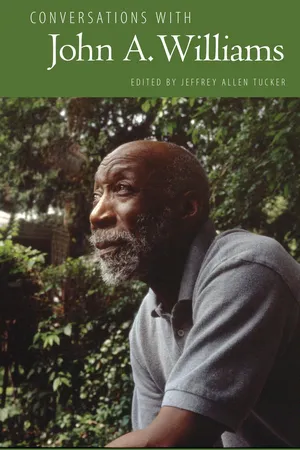
- 324 pages
- English
- ePUB (mobile friendly)
- Available on iOS & Android
Conversations with John A. Williams
About this book
One of the most prolific African American authors of his time, John A. Williams (1925-2015) made his mark as a journalist, educator, and writer. Having worked for Newsweek, Ebony, and Jet magazines, Williams went on to write twelve novels and numerous works of nonfiction. A vital link between the Black Arts movement and the previous era, Williams crafted works of fiction that relied on historical research as much as his own finely honed skills. From The Man Who Cried I Am, a roman à clef about expatriate African American writers in Europe, to Clifford's Blues, a Holocaust novel told in the form of the diary entries of a gay, black, jazz pianist in Dachau, these representations of black experiences marginalized from official histories make him one of our most important writers. Conversations with John A. Williams collects twenty-three interviews with the three-time winner of the American Book Award, beginning with a discussion in 1969 of his early works and ending with a previously unpublished interview from 2005. Gathered from print periodicals as well as radio and television programs, these interviews address a range of topics, including anti-black violence, Williams's WWII naval service, race and publishing, interracial romance, Martin Luther King Jr., growing up in Syracuse, the Prix de Rome scandal, traveling in Africa and Europe, and his reputation as an angry black writer. The conversations prove valuable given how often Williams drew from his own life and career for his fiction. They display the integrity, social engagement, and artistic vision that make him a writer to be reckoned with.
Tools to learn more effectively

Saving Books

Keyword Search

Annotating Text

Listen to it instead
Information
Table of contents
- Cover
- Title Page
- Copyright
- Contents
- Introduction
- Chronology
- On Sons of Darkness, Sons of Light
- An Interview with John A. Williams
- John A. Williams: Agent Provocateur
- Interview—October 25, 1971 and Interview—June 9, 1972
- The Art of John A. Williams
- John A. Williams: On Captain Blackman
- Novelist in Motion: Interview with John A. Williams.
- John Williams at 49: An Interview
- The Black Artist in New York: An Interview with John A. Williams
- An Interview with John A. Williams: Journalist and Novelist
- Contemporary Authors Interview
- Cross-Country Chat with John A. Williams
- Interview with John A. Williams
- An Interview with John A. Williams
- Black Authors: John A. Williams
- On If I Stop I’ll Die: The Comedy and Tragedy of Richard Pryor—Interview with John A. Williams and Dennis A. Williams
- John A. Williams
- An Interview with John A. Williams
- Clifford’s Blues: A Conversation with John A. Williams
- A Cry in the American Wilderness: John A. Williams Reflects on Life, Work, and the American Way
- Hard Truths: John A. Williams Illuminates the Black Experience
- Vanqui: Original Opera that Blends African and Classical Themes
- On Safari West
- Index
Frequently asked questions
- Essential is ideal for learners and professionals who enjoy exploring a wide range of subjects. Access the Essential Library with 800,000+ trusted titles and best-sellers across business, personal growth, and the humanities. Includes unlimited reading time and Standard Read Aloud voice.
- Complete: Perfect for advanced learners and researchers needing full, unrestricted access. Unlock 1.4M+ books across hundreds of subjects, including academic and specialized titles. The Complete Plan also includes advanced features like Premium Read Aloud and Research Assistant.
Please note we cannot support devices running on iOS 13 and Android 7 or earlier. Learn more about using the app